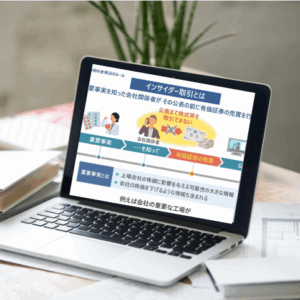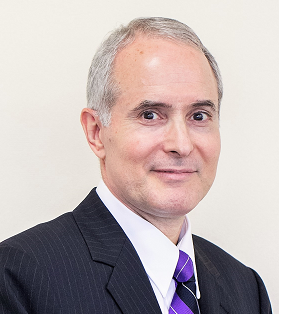
e-learning - Essentials of Directorship
Company Law, Securities Law, Corporate Governance (Basics), Corporate Governance (Practical)
An e-learning course that teaches the fundamentals of governance to executives, managers, and IR personnel at both head offices and subsidiaries. With over 17,000 participants to date, this course is used by many companies for employee training. We encourage you to utilize this course to instill knowledge of key laws and practices, and awareness of governance at your company.
- All modules combined take approximately nine hours to complete. It's a comprehensive course lineup
- Supervised by experts, including the person who proposed Japan corporate governance code to the government
- Designed with a story format and style that makes the content easy to understand.
- Discounts available for group purchases. based on the number of participants
- PC (Windows and Mac compatible), iPhone, iPad, and Android device compatible
The course usage period is one year from the date of account issuance.
The four modules, “Company Law,” “Financial Instruments and Exchange Law,” and “Corporate Governance (Basic and Practical),” are offered as a set package.
Course fee (price per person)
[General course fee]: 22,000 yen (tax included)
[General Corporate Member]: (30% discount) 15,400 yen (tax included) *Please check here for prices based on the number of purchasers.
[Special Corporate Member]: (50% discount) 11,000 yen (tax included) *Please check here for prices based on the number of purchasers.
If a company representative needs to monitor the progress of participants, they will need to purchase a separate administrator ID. The price of an administrator ID is 55,000 yen (tax included). Additional IDs for two or more persons are 33,000 yen (tax included) each. *Administrator IDs are not eligible for corporate membership discounts.
Bulk Discount
For companies other than corporate members applying for more than 11 people, discounts will be based on the number of participants. If you would like to receive a bulk discount, please contact us at info@bdti.or.jp .
If a company representative needs to monitor the progress of participants, they will need to purchase a separate administrator ID. The price of an administrator ID is 55,000 yen (tax included). Additional IDs for two or more persons are 33,000 yen (tax included) each. *Administrator IDs are not eligible for corporate membership discounts.
We will issue your account within this year only if your payment is confirmed by Friday, December 19, 2025.
-
- class, e-Learning
e-ラーニング 「取締役入門」
- ¥22,000 (Tax Included)
- Select options
[Important Notes Regarding Account Issuance]
・After payment is complete, it will take at least five business days to issue an ID for e-learning courses. If you wish to take a course, please apply well in advance.
・Once you have applied, you cannot cancel the e-learning course or change the number of IDs issued.
・Once an ID has been issued, the user ID (registered name) cannot be changed.
The course ID and information email will be sent directly from the contracted company, MBK Wellness, rather than BDTI. Please set your email settings to receive emails from the Business Masters Administration Office at support@bizmas.jp, because otherwise the email may be sorted into your spam folder. Additionally, please be sure to review the following Terms of Use and Privacy Policy before participating in the course.
Business Master Terms: https://info.businessmasters.jp/terms.html
Privacy policy(MBK Wellness): https://www.mbk-wellness.co.jp/privacy-policy
Overview of the Four Courses
Demo can be viewed here
Testimonials from Students











